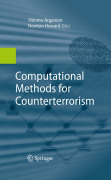
Modern terrorist networks pose an unprecedented threat to international security. The question of how to neutralize that threat is complicated radically bytheir fluid, non-hierarchical structures, religious and ideological motivations, and predominantly non-territorial objectives. Governments and militaries are crafting new policies and doctrines to combat terror, but they desperately need new technologies to make these efforts effective. This book collects a wide range of the most current computational research that addresses critical issues for countering terrorism, including: finding, summarizing, and evaluatingrelevant information from large and changing data stores; simulating and predicting enemy acts and outcomes; and producing actionable intelligence by finding meaningful patterns hidden in huge amounts of noisy data. INDICE: Foreword, James A. HendlerPreface Part I: Information Access 1) OnSearching in the "Real World" 2) Signature-Based Retrieval of Scanned Documents Using Conditional Random Fields 3) What Makes a Good Summary? 4) A Prototype Search Toolkit Part II: Text Analysis 5) Unapparent Information Revelation: Text Mining for Counterterrorism 6) Identification of Sensitive Unclassified Information 7) Rich Language Analysis for Counterterrorism Part III: Graphical Models 8) Dicliques: Finding Needles in Haysticks 9) Information Superiority via Formal Concept Analysis 10) Reflexive Analysis of Groups 11) Evaluating Self-Reflexion Analysis Using Repertory Grids Part IV: Conflict Analysis 12) Anticipating Terrorist Safe Havens from Instability Induced Conflict 13) Applied Counterfactual Reasoning 14) Adversarial Planning in Networks 15) Gaming and Simulating Ethno-Political Conflicts. Index.
- ISBN: 978-3-642-01140-5
- Editorial: Springer
- Encuadernacion: Cartoné
- Páginas: 300
- Fecha Publicación: 01/06/2009
- Nº Volúmenes: 1
- Idioma: Inglés
- Inicio /
- INFORMÁTICA /
- DATOS
